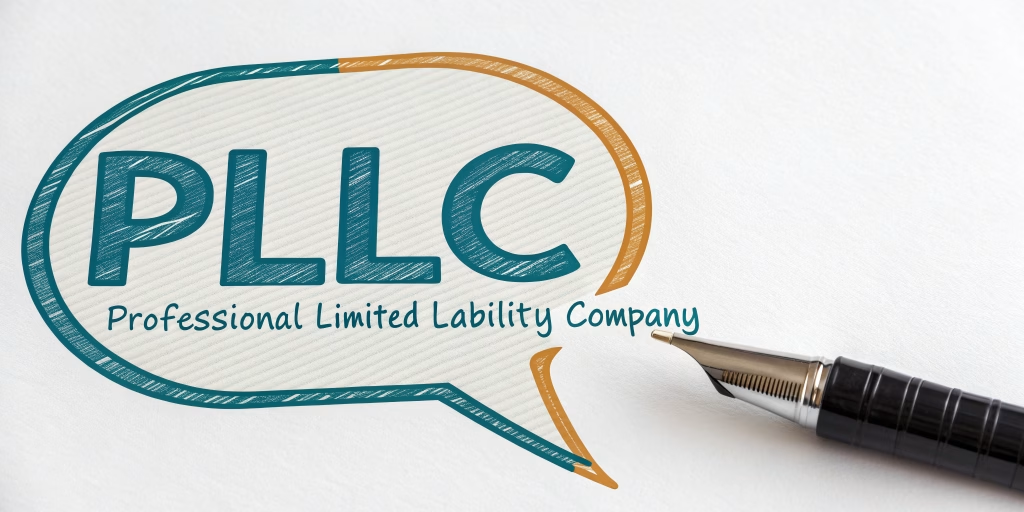Main Point: A PLLC (Professional Limited Liability Company) helps licensed professionals keep personal money and things safe while running a simple, trusted business.
What Is a PLLC?
A PLLC is a special company for people with state licenses. Doctors, lawyers, architects, and accountants often choose a PLLC. It acts like two boxes. One box holds business risks. The other box holds your home, car, and savings. If your business has debts or legal claims, only the business box is at risk. Your personal box stays safe.
Why Pick a PLLC?
Choosing a PLLC gives you two big wins:
- Protects Your Stuff
Business debts and claims stay in the business box. Your personal money and things stay in your personal box. - Builds Trust
Calling your business a PLLC shows clients you follow rules. It makes you look more official. More people will trust you.
How to Start a PLLC
Follow these clear steps:
- Check State Rules
Every state has its own guide for PLLCs. Look on your state’s government website. Read the rules carefully. - Make Sure Your License Is Valid
You must hold a current license in your field. A doctor needs a medical license. An architect needs an architecture license. - Pick a Registered Agent
A registered agent is a person or service in your state. They get legal papers for your PLLC. You must list their name and address. - Prepare Three Documents
- Articles of Organization – This simple form tells the state you have a PLLC.
- Proof of License – A copy or scanned image of your professional license.
- Operating Agreement – A short plan that explains how your PLLC runs. It covers who makes decisions and how profits are shared. Many states do not require it, but it helps avoid arguments later.
- Articles of Organization – This simple form tells the state you have a PLLC.
- File and Pay Fees
Send your documents and pay fees to the state’s business office. Fees usually range from $50 up to $500. Many states let you file online. After you file, wait for state approval. When approved, you are official!
Who Uses PLLCs?
Licensed pros in many fields choose PLLCs:
- Doctors and Dentists
They treat patients and want to keep savings safe. - Lawyers
They serve clients and manage legal risks. - Accountants and Financial Advisors
They handle money and want a safe setup. - Therapists and Chiropractors
They help patients and want a trusted image. - Engineers and Architects
They plan projects and protect their personal funds. - Consultants and Freelancers
They work alone and want more credibility.
PLLC vs. LLC
Both PLLCs and LLCs keep your personal stuff safe. They differ in three main ways:
- Who Can Own
- LLCs: Anyone can own part of the business.
- PLLCs: Only licensed professionals in the field can own part.
- LLCs: Anyone can own part of the business.
- Rules to Follow
- LLCs: Follow general state rules.
- PLLCs: Follow extra rules for professional fields.
- LLCs: Follow general state rules.
- Extra Fees
- Some states charge small extra fees for PLLCs because they serve licensed fields.
- Some states charge small extra fees for PLLCs because they serve licensed fields.
PLLC vs. Professional Corporation (PC)
A Professional Corporation (PC) is another choice for licensed pros. Key differences:
- Setup Steps
- PCs: Need corporate bylaws and a board of directors.
- PLLCs: Need a simple Operating Agreement and fewer formal meetings.
- PCs: Need corporate bylaws and a board of directors.
- Meetings and Records
- PCs: Must hold regular board meetings and keep detailed minutes.
- PLLCs: Let owners meet and decide quickly.
- PCs: Must hold regular board meetings and keep detailed minutes.
- Taxes
- PCs: Can face double taxation (corporate tax then dividend tax).
- PLLCs: Pass all income to owners for one tax filing.
- PCs: Can face double taxation (corporate tax then dividend tax).
PLLC vs. Partnerships
You might also think of partnerships:
- General Partnership
No shield. Each partner’s personal money and things can be used to pay business debts. - Limited Liability Partnership (LLP)
Some shield exists, but rules vary by state and by profession. - PLLC
Full shield for licensed services. Clear separation of personal and business risks.
Extra Details on Formation
Name Rules
Your PLLC name must end with “PLLC” or “P.L.L.C.” Some states add “Professional Limited Liability Company.” Avoid names that sound like other companies.
Operating Agreement Tips
While not always required, this short plan helps you:
- Share profits and losses fairly.
- Say who makes which decisions.
- Explain what happens if a member leaves or loses a license.
Annual Steps
Most states ask for an annual report. You update basic info and pay a small fee, often $20 to $100. If you skip it, you may pay fines or lose your good standing.
Real-Life Examples
- Solo Therapist
A therapist opens a PLLC alone. She files her license proof and forms her PLLC. Now she avoids double tax and keeps her savings safe. - Small Group of Accountants
Three accountants team up. They form a PLLC to split profits and protect each other’s personal money. - Marketing Consultant
A solo consultant earns a special license. She then forms a PLLC to look more official and win bigger contracts.
Advantages of a PLLC
- Protects Your Assets
Your home, car, and savings stay safe from business claims. - Boosts Credibility
Calling your business a PLLC shows you follow strict rules. - Easy Management
You set up simple rules. You meet and decide quickly. - Simple Taxes
All profits pass to you for one tax return. No corporate tax step.
Disadvantages of a PLLC
- Upfront Costs
You pay filing fees and possible lawyer fees. - Yearly Fees
You pay for annual reports and registered agent fees. - Member Limits
Only licensed pros can join. No outside investors. - Service Limits
You can offer only services tied to your license. - State Variations
Each state has its own rules. You must follow them.
Is a PLLC Right for You?
Answer these simple questions:
- Do you hold a state license?
- Will you only work in that licensed field?
- Can you pay formation and annual fees?
- Do you want a simple setup with one tax form?
- Do you want to appear professional to clients?
If you said “yes” to most, a PLLC may fit you well. Always ask a lawyer or tax advisor to guide you for your state.
Conclusion
A PLLC is a smart choice for licensed professionals. It keeps your personal money and things safe. It boosts trust and still lets you keep simple, clear rules. By following state steps and knowing costs, you can set up a PLLC with confidence. For exact advice, talk to a legal or financial expert today.





